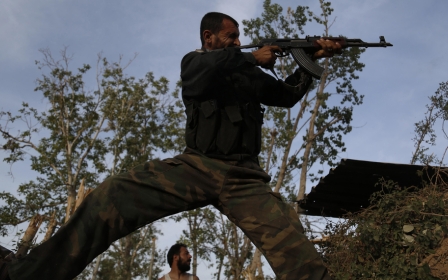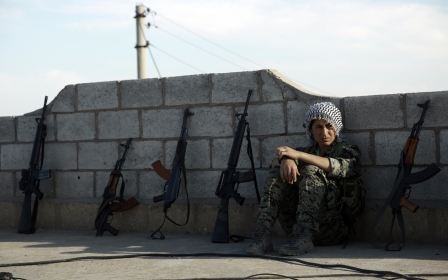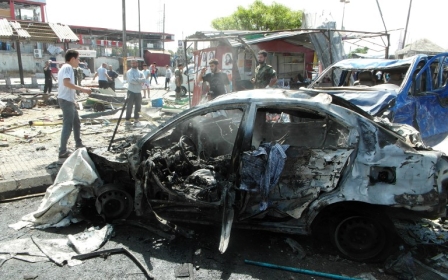Kurd-Arab alliance launches offensive to 'liberate' IS-held Raqqa

A coalition of Arabs and Kurds said on Tuesday they had launched an assault on an area north of the Islamic State (IS) group's de facto capital of Raqqa as Washington and Moscow scrambled to salvage Syria's shaky ceasefire.
"With the participation of all Syrian Democratic Forces (SDF) units, we start this operation to liberate northern Raqqa," said Rojda Felat, a commander with the SDF, in a video statement on Tuesday:
"The campaign is aimed at repelling terrorist attacks on Shaddadi, Tal Abyad and Kobane, ensuring the security of our people," he said, referring to strongholds controlled by the SDF in northern Syria.
The SDF is composed of a variety of Arabs, Turkmen, Assyrians and others, though it is generally regarded as being dominated by the pro-Kurdish People's Protection Units (YPG).
According to the Firat News Agency, a news agency linked to the Kurdistan Workers Party (PKK) - who themselves have been linked to the YPG - the operation will cover an area 4kms by 15kms about 50kms north of Raqqa city.
A commander from Tal Abyad told the site that the "goal of the operation in North Raqqa is to cut the gangs' supply routes and corner them further into the south."
Russia's foreign minister said on Tuesday that Moscow, which is a key military backer of the Syrian government, was prepared to coordinate with the SDF and the US-led coalition against IS in attacks on the group's stronghold.
"I say with all authority that we are ready for such coordination," Sergei Lavrov said at a summit in Uzbekistan, quoted by TASS state news agency.
"We are convinced it would have been possible to more effectively and quickly liberate these populated areas if our militaries [Russian and US] had started coordinating their actions much earlier," Lavrov said.
The US last week rejected a Russian proposal to launch joint air strikes against IS in Syria, saying it did not collaborate or coordinate with Russia on any operations in Syria.
IS is currently facing major assaults on its territory in Syria and in Iraq, where Iraqi forces have begun an offensive to retake the city of Fallujah.
Elsewhere in Syria, a government offensive targeting rebel-held areas outside the capital Damascus dealt a further blow to international efforts to enforce a viable ceasefire that would allow peace talks aimed at ending the five-year war to resume.
The latest calls on both sides to respect a truce between pro-government fighters and some opposition rebels groups negotiated by the US and Russia in February came as at least 161 people were killed in car bombings and suicide attacks on Monday in the northwestern cities of Jableh and Tartus that were claimed by IS.
IS was also reported on Tuesday to have caused extensive damage to an air base used by Russian forces in the centre of the country.
Satellite images published by the Stratfor website appeared to show at least four helicopters and 20 lorries destroyed by fire at the T-4 base, known as Tiyas, between Homs and Palmyra.
The US envoy for Syria late on Monday urged rebels to respect the ceasefire after they gave its brokers - Washington and Moscow - until Tuesday afternoon to stop the advance on rebel bastions outside Damascus.
"We recognise that the CoH (Cessation of Hostilities) is under severe stress, but believe that to abandon it now would be strategic error," Michael Ratney said in a statement on Twitter.
"If the armed factions abandoned the CoH, Assad and his supporters would claim this gives them licence to attack all the opposition forces without international objection."
Twenty-nine rebel groups had called on Washington and Moscow to force Assad's government "to completely and immediately halt their brutal offensive against Daraya and Eastern Ghouta," near Damascus.
On Monday, government supporters in Tartus were accused of exacting revenge against refugees for the bombings by attacking an internally displaced persons' camp mostly housing refugees from Aleppo and Idlib, according to the Syria Direct website.
According to a lawyer from Tartus, who requested anonymity, a group of young men “set fire to several tents at the al-Karnak camp which contains about 400 Sunni families who have fled to the area”.
“We’ve been dealing with this rising sectarianism for the past few years,” he added.
“After today’s bombings, people wanted to take their anger out; the fact that they did so in this way is a clear indication of the monstrous way this hatred can manifest itself.”
New 'regime of silence'
Syria's army, backed by Lebanon's Shia militia Hezbollah, last Thursday recaptured the town of Deir al-Assafir and nine nearby villages in the south of Eastern Ghouta.
The town was one of the first to erupt in demonstrations against the government in 2011. It has been under a tight government siege since late 2012.
Russia, which is providing military support for the Syrian government, late on Monday called for a temporary local truce in Eastern Ghouta and Daraya - within the wider nationwide ceasefire - from Tuesday.
"The Russian reconciliation centre is calling for a 72-hour regime of silence in Eastern Ghouta and Daraya," Russia's defence ministry quoted the head of the Russian coordination centre in Syria, Sergei Kuralenko, as saying.
The February ceasefire does not include the Islamic State group and the rival Nusra Front, al-Qaeda's local affiliate.
Kuralenko reiterated Moscow's call for moderate rebels to withdraw from areas controlled by Nusra and break ranks with the group, saying Russia would keep targeting the militants.
World powers had hoped the ceasefire would lead to a peace deal to end a conflict that has killed more than 270,000 people and displaced millions.
But the latest round of UN-backed peace talks ended in deadlock last month after the opposition walked out of negotiations in Geneva in frustration over the lack of humanitarian access.
New MEE newsletter: Jerusalem Dispatch
Sign up to get the latest insights and analysis on Israel-Palestine, alongside Turkey Unpacked and other MEE newsletters
Middle East Eye delivers independent and unrivalled coverage and analysis of the Middle East, North Africa and beyond. To learn more about republishing this content and the associated fees, please fill out this form. More about MEE can be found here.




